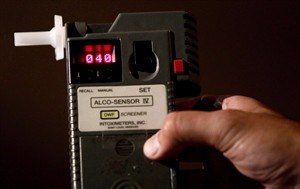
An RCMP Constable holds a breathalyzer test in Surrey, B.C., in this September 24, 2010 photo. A drunk driver who got off on a technicality had his conviction and sentence restored by Ontario's top court.THE CANADIAN PRESS/Darryl Dyck
June 20, 2012 - 1:27 PM
TORONTO - A drunk driver who got off on a technicality had his conviction and sentence restored by Ontario's top court Wednesday in a case that could have had widespread impact on such prosecutions.
The Appeal Court of Ontario ruled that a lower court judge was wrong to call into question breathalyzer evidence that showed Terrance O'Meara to have been clearly intoxicated behind the wheel.
O'Meara was convicted in October 2010 of "over 80" drunk driving in what the Crown called the "most usual of drinking and driving trials."
At trial, a provincial police officer testified that police stopped the driver in November 2009 at a spot check near North Bay, Ont., and smelled alcohol.
O'Meara failed a roadside breath test, was arrested, and taken to the police station where he provided two breath samples 22 minutes apart that showed his blood-alcohol level to be more than twice the legal limit.
The defence did not dispute the trial evidence, and the Ontario court judge convicted O'Meara, slapping him with the minimum $1,000 fine and a 12-month driving ban.
O'Meara appealed the summary conviction, arguing the prosecution had introduced no evidence at trial that an approved instrument had analyzed the breath samples as the Criminal Code requires.
The summary-conviction appeal court judge agreed with the defence there was no evidence to prove the samples were in fact properly analyzed, and overturned the guilty finding, prompting the Crown to appeal to the province's top court.
In its appeal, the Crown argued the readings of the breathalyzer instrument — which was operating correctly in the hands of an approved technician — were themselves sufficient evidence of proper analysis of the breath samples, and separate testimony to that effect wasn't needed.
In taking the case, the Court of Appeal agreed with the prosecution on its importance given its potential to "negatively affect many other 'over 80' cases."
It also noted the officer had testified at trial that O'Meara blew into the mouth-piece of the approved and working instrument and that this provided a suitable sample for analysis.
"This was ample circumstantial evidence from which the trial judge could properly conclude ... that the respondent's breath samples were received directly into the approved instrument," the Appeal Court found.
"The trial judge relied on circumstantial evidence to infer that the samples were analyzed by an approved instrument."
News from © The Canadian Press, 2012